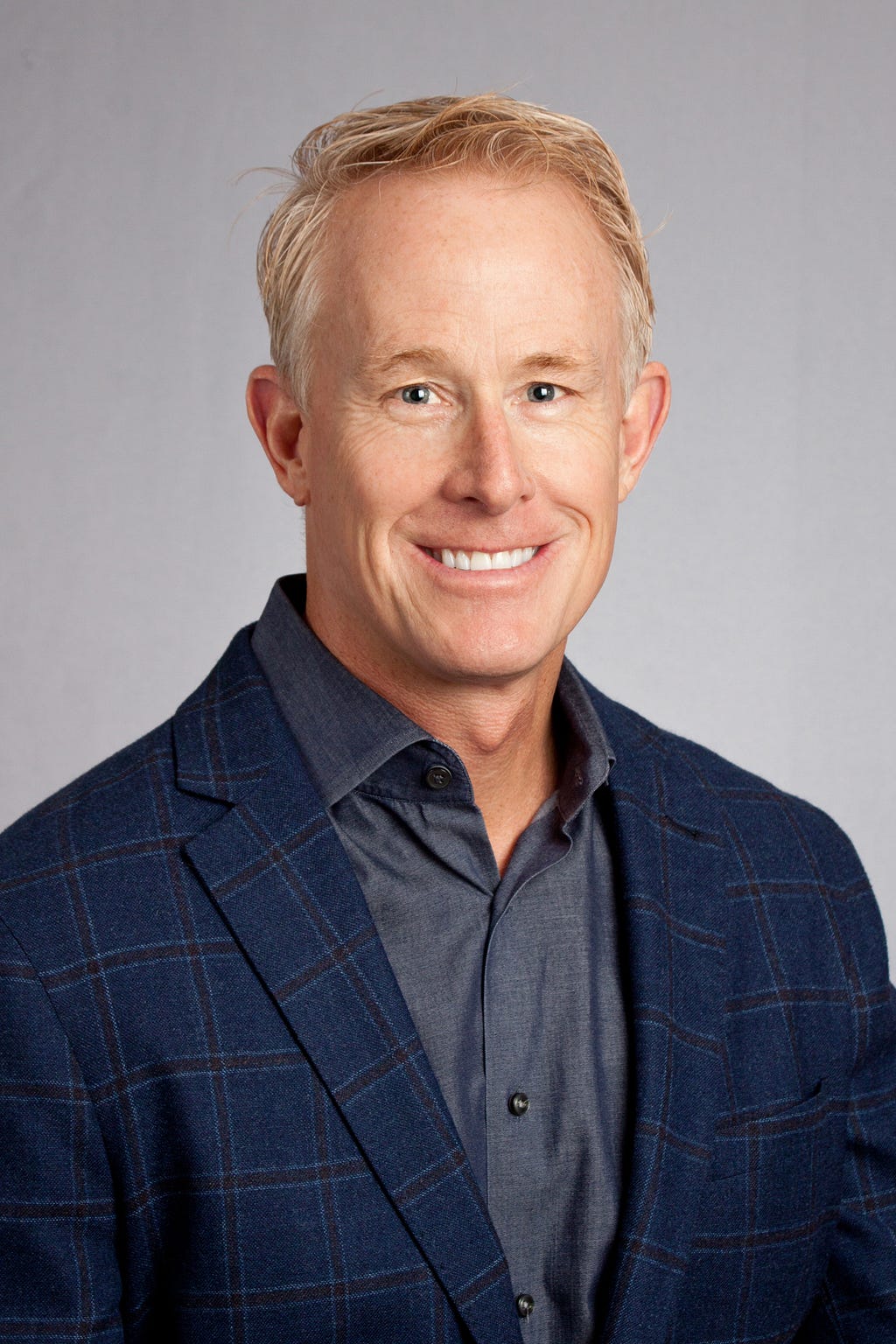Dan Hawkins of Summit Leadership Partners: Five Things You Need To Be A Highly Effective Leader During Uncertain & Turbulent Times

Deprioritize, but don’t kill all priorities: What are the two or three things you’re going to continue no matter what? Choose what to prioritize carefully and have a clear sense of the expected return. During COVID, we made our biggest spend on marketing to that point, which helped build the brand, extend our messaging, and improve consulting quality internally as well.
As part of our series about the “Five Things You Need To Be A Highly Effective Leader During Turbulent Times”, we had the pleasure of interviewing Dan Hawkins.
As CEO and Founder of Summit Leadership Partners, Dan Hawkins advises boards, CEOs, investors, and business leaders on strategy execution and value creation through leadership and organization performance. He leads a team of experienced consultants who work hand-in-hand with private equity and mid-market clients.
Dan brings 30+ years of proven corporate success with high-performing global companies, including as a CHRO. He holds an NACD Directorship Certification and is a Board Certified Executive Coach, and he has been featured in numerous publications and industry journals, including The Wall Street Journal earlier this year. He has deep expertise in leadership, strategy, assessment, and executive and organization development with a focus on outcomes.
Thank you so much for your time! I know that you are a very busy person. Our readers would love to “get to know you” a bit better. Can you tell us a bit about your ‘backstory’ and how you got started?
Growing up, I watched my dad build a small consulting company as an executive leadership coach in Summit, NJ. He had just three main clients, and I observed him as he created incredible value for his clients and their organizations. That’s why I chose to pursue degrees and a career in leadership and organizational performance. For the first 20+ years of my career, I worked in larger public companies, but I knew that one day I wanted to do something entrepreneurial.
During my time in the corporate world, I developed various skills working in HR, executive development, and strategic talent management. As a CHRO in a large private equity-backed company, I saw a significant gap in human capital consulting for mid-market companies. Consultants spent all their time assessing talent and failed to address and improve organizational performance. So, I set out to create a team of incredibly skilled experts who work to unlock potential in leaders and organizations across the middle market.
Investors and CEOs need more than an assessment report with a letter grade. They need a trusted partner to identify and build leadership capabilities at various stages of business growth.
It has been said that our mistakes can be our greatest teachers. Can you share a story about the funniest mistake you made when you were first starting? Can you tell us what lesson you learned from that?
After I started Summit Leadership Partners in 2014, I got an opportunity through my network to pitch my first big RFP for a Fortune 50 company. This was a prominent human capital and organization assessment project, and, as a newly founded company, it was up to me. I didn’t have a clear sense yet of appropriate pricing for a project of that scope or an established RFP process. I also learned other large, famous consulting companies were competing against me.
Looking back on it, I lacked some of the confidence necessary to sell my product at the market rate. The pitch went well overall, and the company called me the next day. To my surprise, they said: “We liked it, but you set the price too low. You need to push up the price, or you won’t make any money.” At this stage, at the company’s beginning, I was casting a wide net to land business, and they were right that I had undervalued my services.
I started reading a couple of books about pricing, how to sell, and knowing the true value of the services you offer clients. Following that, I even rehearsed my sales pitch, asking for a higher price in front of a mirror. I’ve learned a lot since then. Now, I love to sell because I’m incredibly confident and proud of the value we provide. In consulting, you can’t just sell your cost and hourly rate plus some margin. Pricing conveys the quality of your services and the outcomes they support. The success of Summit is a testament to how much our clients value us, as well as our passion and commitment to quality.
None of us are able to achieve success without some help along the way. Is there a particular person who you are grateful towards who helped get you to where you are? Can you share a story?
The most influential person in my life is my dad. His executive coaching practice was based in Summit, New Jersey, where I grew up, which is also where Summit Leadership Partners gets its name. I learned from him that running your own business means you need to prepare for highs and lows. He didn’t let the swings of business get him down, and he taught me not to either. I also learned the importance of diversification among your client base, so if a client relationship ends, the business can maintain stability.
He also taught me that, as an entrepreneur, you are always on. You have clients and employees to care for, but you need to integrate personal and work life effectively. Even when he was busy with work, my dad prioritized the family being together at the dinner table. Or if we went on vacation, he made it a point to finish any work early in the morning so he could focus on family the rest of the day. Family is so important to me, and I learned from my dad that you can focus on the things that matter most — family, health, and leading a fulfilling life — while still running a thriving business and delivering excellent client service.
Extensive research suggests that “purpose-driven businesses” are more successful in many areas. When your organization started, what was its vision, what was its purpose?
The vision and purpose of Summit Leadership Partners is to unlock potential leaders and organizations in the middle market. Private equity-backed companies have high performance expectations to meet, but too often their potential is constrained by leadership and organization capability challenges. We are dedicated to helping them, facilitating growth, seeing founder-CEOs succeed, and paving the way to value creation. Our reason for getting up in the morning is to help leaders and companies clear roadblocks and reach their peak potential.
Thank you for all that. Let’s now turn to the main focus of our discussion. Can you share with our readers a story from your own experience about how you lead your team during uncertain or difficult times?
We remember that date when things shut down around the start of COVID-19: March 13, 2020. There was a lot of uncertainty, but we didn’t panic. We focused on building resilience — ensuring liquidity and positive cash flow — while making sure to keep our people busy and engaged. In the beginning of the pandemic, there were two or three months where clients completely shut down. As a leader of my company, I knew it was critical to get in front of employees and communicate with them candidly and consistently. We shifted employees to work on internal products, consulting team modules, training programs, marketing materials, and more. Even though we weren’t sure what lay ahead for us, it was extremely important to me to maintain a healthy business and keep our people engaged so we were ready to capitalize on opportunities when the time came. I’m very proud of how we performed during those challenging times. We did not release any employees, reduce work schedules, or mandate any salary decreases during this period.
Did you ever consider giving up? Where did you get the motivation to continue through your challenges? What sustains your drive?
I was offered a big CHRO role at a Fortune 100 company within the first couple of years of starting Summit. The compensation was ample, and while I can’t say I almost accepted the offer, I did consider it. At that time, Summit was taking off, but I also saw former colleagues and direct reports getting promoted to major roles in big companies. I was envious and wondered if I made the right decisions. I talked to my wife about it, and she was a great coach to me. She reminded me about what was important and why I started Summit. She knew I wanted to build a great business without the bureaucracy of a large company, inspire people at Summit, and help mid-market clients. Money wasn’t the main deciding factor for my professional life. So, I turned down the job offer and was motivated to work even harder. It was one of the best decisions I ever made. And it put fuel in the tank.
I’m an author and I believe that books have the power to change lives. Do you have a book in your life that impacted you and inspired you to be an effective leader? Can you share a story?
When I first started Summit, I didn’t like selling and really struggled with it. I perceived selling as somewhat disingenuous and cheesy. Maybe I felt that when consultants sold to me in past roles. I read To Sell Is Human by Daniel Pink, which changed my viewpoint on selling and made me think about what my company brings to the table. Through that book, I realized that I’ve been selling my whole life. My perspective on sales changed from it being a contrived conversation to showing clients how we can solve their problems. Now, I love to sell! I’m eager to tackle the challenges my clients face together with my amazing team.
What would you say is the most critical role of a leader during challenging times?
During tough times, it’s important for a leader to be real, authentic, empathetic, and confident. Connect with your people in person whenever possible — ideally not just by email or over Zoom. You must get in front. Town halls and platitudes are not how you engage people. Let your people know regularly that you’re committed to them and are receptive to learning about their challenges.
Also, don’t feel like you must be perfect or have all the answers. It’s OK to say: “These are uncertain times. We face unique circumstances, and I’m not 100% sure what’s ahead, but we’re going to get through it together.” Listen to concerns from your people and address them, but you also need to convey a sense of confidence and optimism for the future. Demonstrate accountability through your leadership and experience, and that helps reduce uncertainty within your organization.
When the future seems so uncertain, what is the best way to boost morale? What can a leader do to inspire, motivate, and engage their team?
Engagement is key, and people are involved with work they see as valuable. When addressing your staff, don’t make false promises — they’ll fall short and people will see through it. During the pandemic, for example, we stayed busy by focusing on internal consulting products, materials, and initiatives that created value. That kept our people engaged and made the company better in the long run.
As a leader, if you are absent, then morale is lost. Your people may ruminate about uncertainty and potentially create false narratives, which negatively impacts internal connections and organizational health. Leaders have to be optimistic and realistic at the same time. Your staff wants to hear how the company will handle the uncertainty. Give people a balanced perspective of the situation and keep them engaged within the organization.
What is the best way to communicate difficult news to one’s team and customers?
At Summit, we’ve actually won over a lot of customers by being candid and getting ahead of difficult situations. We have a company value called ‘Courageous Partnering,’ and our clients expect nothing less. We work hard to tell clients what they need to hear. Maybe it’s not always what they want to hear, but it’s critical to provide that counsel. Our clients trust us to tell them hard truths, such as why someone’s not the right fit for a key executive role or where a strategic objective is misaligned. At Summit, we encourage our staff to be direct, which our clients value and appreciate.
How can a leader make plans when the future is so unpredictable?
By staying level-headed, communicating early and often with your team, and being flexible, you can demonstrate strong leadership and increase your chances of success. When things become unpredictable, remember that the plans you make today may not be the same plans you need tomorrow. Be willing to adapt to your company’s needs while staying true to your original growth plan. Remember to fight for how your company solves problems for your clients and focus on how that delivers value.
Is there a “number one principle” that can help guide a company through the ups and downs of turbulent times?
I think about the phrase “this too shall pass,” which is something that has stuck with me since I was young. We used that mindset at Summit during the pandemic as we faced different challenges. We didn’t panic and knew that we would make it through and maybe even be stronger for it. As a leader, it might be hard to see over the hill you’re facing, but by staying the course and trusting in the program you built, you can rest assured that the hard times will pass along the way to continued success.
Can you share 3 or 4 of the most common mistakes you have seen other businesses make during difficult times? What should one keep in mind to avoid that?
Some of the most common mistakes I’ve seen businesses make include cutting costs too fast, abandoning strategy too quickly, or lacking a clear picture of their financial health. During difficult times, remember that this too shall pass, and you have to be ready to capitalize on future opportunities.

Here is the primary question of our discussion. Based on your experience and success, what are the five most important things a business leader should do to lead effectively during uncertain and turbulent times? Please share a story or an example for each.
The five most important things for a leader to do during uncertainty are:
- Monitor cash flow and financial health closely: Protect your cash because cash is king; it’s survival. You have to make payroll and pay vendors, so you need to know your threshold. At Summit, we always had a rolling three-month supply of cash during the pandemic and knew precisely what that looked like.
- Plan for three potential scenarios: You need to be agile and adaptable, so it’s wise to plan for a range of potential scenarios: the best situation, the likely situation, and the worst situation. If you communicate that scenario planning to your executives and staff, then everyone knows you have a plan and can respond to any situation.
- Communicate directly and regularly with employees: Be authentic and real. Be clear about what your employees can do and keep them engaged. Be mindful of their needs and expectations as well, otherwise it can become a management problem. You need to work together and find ways to add value for the company even when there’s a slowdown in the business. Then you’ll also be prepared for the eventual upswing.
- Prioritize customers and employees above all else: Summit constantly talked during the pandemic about how to connect with customers and clients. We offered a range of free resources and webinars to continue providing value to our clients even while they were still experiencing business interruption. That also helped keep our people engaged and working on the types of initiatives they care about.
- Deprioritize, but don’t kill all priorities: What are the two or three things you’re going to continue no matter what? Choose what to prioritize carefully and have a clear sense of the expected return. During COVID, we made our biggest spend on marketing to that point, which helped build the brand, extend our messaging, and improve consulting quality internally as well.
Can you please give us your favorite “Life Lesson Quote”? Can you share how that was relevant to you in your life?
If it doesn’t hurt or isn’t challenging, then you’re not pushing yourself. In life, I’m a bit of a thrill-seeker, which has helped push me toward peak performance. It’s important to take some calculated risks. You should be a little sore when trying something new, because that means you’re growing and exploring your potential. I push for myself, our team, and the organization. When you are comfortable with being uncomfortable, you can become a better person than you thought you could be.
How can our readers further follow your work?
I am always happy to connect through my LinkedIn, or they can visit us at SummitLeadership.com.
Thank you so much for sharing these important insights. We wish you continued success and good health!
Dan Hawkins of Summit Leadership Partners: Five Things You Need To Be A Highly Effective Leader… was originally published in Authority Magazine on Medium, where people are continuing the conversation by highlighting and responding to this story.
